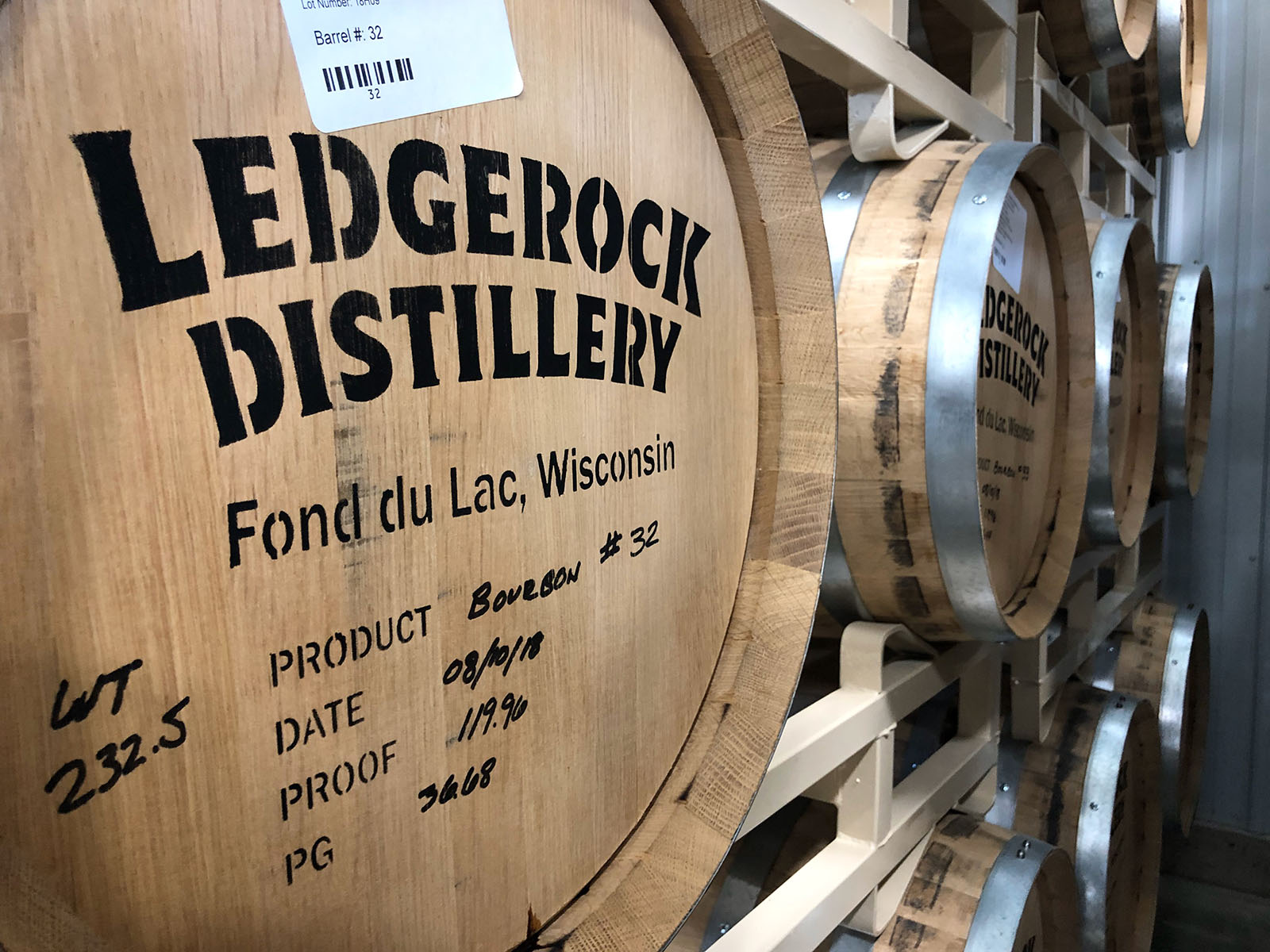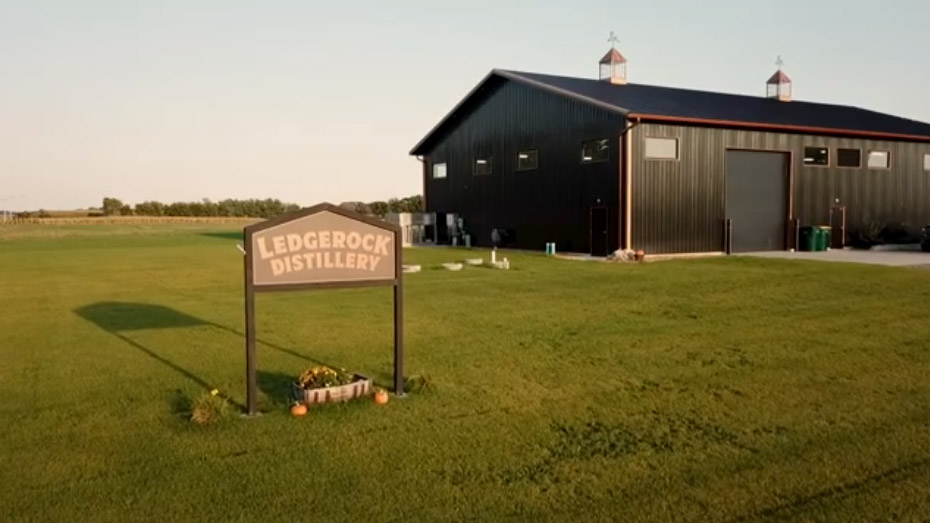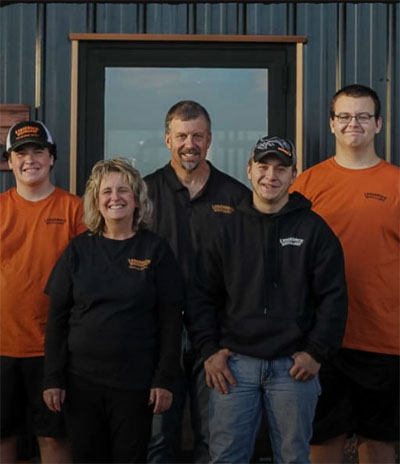"Bar Month" at OnMilwaukee is back! For the entire month of March, we're serving up fun articles on bars, clubs and beverages – including guides, the latest trends, bar reviews, the results of our Best of Bars poll and more. Follow along with the #DrinkOnMke hashtag too. Grab a designated driver and dive in!
To cap off a late summer camping trip, I managed to convince the family to stop for our umpteenth distillery tour of the year at a place called Ledgerock Distillery, just outside Fond du Lac in Empire Township (map it!).
What we found was unlike any of the other distilleries we saw in our U.S. (and Irish) travels that year.
Owner Jay Retzer showed us around his distillery, which is a small, but significant part of his family farm. Touring us through the distillery, Retzer – who also holds an office job in addition to working the more than 500-acre farm without hired hands – told us that his son Bryce is the head distiller and that nearly all the grain used in his whiskeys, vodka and gin are grown right outside the front door.

We’d walked into a farm distillery, the kind of place where distilling has gone on for centuries. Long before whiskey was bottled or distilled in big industrial-sized plants, farmers distilled in order to make the most of their grain, and here was a guy doing the exact same thing about an hour from Milwaukee.
We had to talk...
OnMilwaukee: Let’s start with the farm...
Jay Retzer: Heidi and I moved onto the farm we are at now in 1998. I was managing several thousand acres of farmland for a local investor, and he allowed us to rent and then own this piece of real estate which he owned at the time. We officially purchased the land and buildings in 2002.
Many of the local old-timers had told me that this was the best piece of farmland in Empire Township and we agree. We essentially started with 80 acres and with an additional purchase and rented land we have since built our cropped acres to a little over 500 acres today.
Our crop rotation today consists of yellow corn, soybeans, soft red winter wheat and alfalfa. From early on I really believed in the concept of doing as little tillage as possible to promote better soil health, reduce wind and water erosion and farm more efficiently by needing less equipment, labor and time.
We have been no-tilling and doing minimum vertical tillage when needed since 2004. We also rotate our crops and incorporate cover crops into the mix when possible. We are very proud of how we farm and feel we are producing very high-yielding high-quality grains and forages with a minimal impact on the environment. We just signed up with Indigo Ag to actually be paid for carbon sequestration on a per acre basis which is due to the no-till and cover crops we do.

(PHOTO: Ledgerock Distillery)
Did you guys grow up farming?
I grew up near Ashford (in Fond du Lac County) on a small livestock and crop farm. Dad worked off-farm so I had the opportunity to take on a lot of responsibility at a young age. I obtained my BS in Agronomy from UW-River Falls in 1992.
Heidi grew up 20 minutes away near Eden. She graduated from UW-Oshkosh in 1993 and has taught at Campbellsport High School ever since … the same HS we both attended and met at. She is a special education specialist. We have three boys: Bryce (21), Hoyt (19) and Brock (15).
You also have a "day job," don't you?
Yes Heidi and I both work full-time off the farm. I work as a dairy lending specialist for Compeer Financial in Fond du Lac. Basically I am a loan officer for dairy farmers. I have been with the company for 12 years. Farming is done nights, weekends and with the use of vacation time.
How did you come to distilling?
I came to the idea of distilling accidentally, quite honestly. A few years back I was, just for fun, researching whiskey production and the equipment that it would take to do some on a small scale. I discovered this craft distilling world that was already 10 years old that I hadn’t really paid any attention to.
What really sparked my interest was when I noticed several distillers promoting the fact that they were purchasing their corn and other grains from local farmers, if not growing it themselves. There is was … a way to add value to the grains we are already growing.
The idea of processing some of our grain right at our farm to create a product I could then market right from our farm was very appealing to me, so much so that my research and desire to learn everything I could about the business went into overdrive. After attending a few classes and as many educational events as I could find, I had a pretty good idea that this was something we could do and do very well.
We proceeded to put our business plan together, secured financing and started to build our business. The building began going up in April 2017. We finally were able to start distilling in April 2018 and we opened our doors to the public in June of 2018.
Were your neighboring farmers skeptical?
There are always skeptics when you go out on a limb and try to do something different and farmers are no different. I had one local dairyman tell me that he would never take on a venture such as mine where there is not a developed market for my brand. He felt that at least he always has a buyer who takes all of his milk production every day.
Another told me that he would never try to start a business from scratch without having been in the business to start with. A third just looked me in the eyes and asked, "What possessed you to think building a distillery is a good idea?"
I actually expected more pessimism than we were confronted with. I think the success of some other local value added ag ventures has helped gain us more acceptance and support than not: Kelly’s Country Creamery, LaClaire Cheese, Armstrong Apples and Winery, Vines and Rushes Winery, J.Henry and Sons ... the success of all these ag businesses definitely has people more willing to accept that at some point we need to break the tradition of just producing a commodity and hoping you get paid enough to cover costs.
Was there a steep learning curve to getting going?
 The learning curve has been incredibly steep. In fact, starting this business has been the toughest thing I have ever done! I am not even sure where to start or where to finish with this topic as I could go on for days.
The learning curve has been incredibly steep. In fact, starting this business has been the toughest thing I have ever done! I am not even sure where to start or where to finish with this topic as I could go on for days.
As much research and planning as we did we still encountered issues with construction, permitting, equipment purchasing, our process early on, label approvals, distribution, etc. Many times it was a matter of someone walking into our world with a different opinion as to how we were "supposed" to be doing things. I think since the distilling world is still relatively young, those you hire to help build your business, both physically and financially, may or may not have any idea as to what needs to be done or how to do it.
Of course, what a rule or statute means to me might not be how you interpret it so there is potentially a conflict, and that did happen. I will say for the most part we were on the right track with most of the things we were questioned on, we just had to defend ourselves on many occasions. There were several times when I just about threw my hands up and said forget this.
I don’t think the learning curve is ever really going to flatten out for us, at least not in the foreseeable future. As we gain confidence in our brand and the products we are putting out, I am always thinking about what I should be considering next as far as production efficiency, products we are making, etc .… every run we do at this point is still somewhat experimental especially with our whiskeys. I keep trying different yeast, different grain ratios, different barrels and then we have to hurry up and wait a few years to determine if we did good or not.
I know you grow your own grain, but do you grow everything you use: the botanicals in the gin, etc.?
Corn is the No. 1 grain we use as our vodka and gin are 100 percent corn-based. Our bourbon and corn whiskey are different combinations of corn, winter wheat and malted barley. We grow all of the corn and wheat we use in the distillery on our farm. We are also considering planting some winter rye in the future to make some rye whiskey, as that is requested quite often.
Botanicals for gin are purchased from a company that specializes in brewing and distilling ingredients. We did plant a few juniper bushes a few years ago to use in the gin but they are still too small to provide any berries.
Do you malt your own grain?
I use such a small percentage of malted barley, and only for bourbon, that we purchase that from Briess Malt in Chilton. We can grow barley and if we start using a lot more in the future I could have some toll malted for me so I get my own grain back.
It's interesting that what you do is very much like how distilling was done for centuries before it became more of an industrial enterprise.
I do think it’s interesting that we are using distilling as a way to turn a high volume commodity into a finished product that is easier to handle … much like the farmers 150 years ago. They didn’t have the infrastructure to haul all their grain through the mountains to market so they figured out they could distill out the alcohol and move and sell that easier.
Do you feel a kinship with that past?
Yes, I guess there is a kinship for me to the past that most non-farm distillers can’t lay claim to. I like to tell folks that I would rather sell my corn by the bottle than by the bushel, and that does relate directly back to the early days of our country.
What percentage of your business is distilling vs. farming at this point in terms of income, in terms of cost and in terms of labor?
I really have separated the distilling business from the farm as far as tracking financials. At the moment the distillery would be 25 percent of total farm income but we are very early in the development of our brand yet.
Labor is higher with the distillery as I am paying 1.5 employees whereas I do most of the farm work myself and don’t take a draw.
Folks ask if I use all my grain for spirits and the short answer is no. At this point a very small percentage of what we grow makes it to the bottle. Over time that will grow, but we are pretty young yet.
Are you guys collaborating with other distilleries or brewers, etc.?
We are not officially collaborating with anyone else at the moment although we are in negotiations with a local brewery who is interested in some joint marketing.
We have been approached by several people who are going to or want to build distilleries and like the idea of having someone put some bourbon in the barrel ahead of time so it can get some age on it while they are building. Contract distilling is definitely in our future, meaning I will make spirits for others to put into their bottle under their own label. The more of my grain I can use through the distillery the happier I will be and making product for others is a good way to expand the business.
Is the word getting out about Ledgerock?
Yes, word is getting out about Ledgerock. Heidi does a great job of keeping the website and Facebook page fresh along with promoting all the events we do. Social media has been our primary way of advertising, and of course over time word of mouth is really starting to really spread.
Has the Whiskey Vault review had an impact?
We appreciate all the great reviews we have gotten and that has propelled us into the No. 2 thing to do in Fond du Lac on TripAdvisor, which folks travelling through tend to find us on. Our local visitors bureau has done a great job of promoting us also.
We offer free tours and free tastings at this time which really helps bring people in. As for off-premise, we do tastings whenever we can, take part in the Midwest Food Expo and will be at Distill America in Madison this year, along with some local events in Fond du Lac.
What’s your product line look like?
At the moment we have five products available for sale. Vodka, gin and moonshine are all 100 percent corn-based. As far as our whiskey is concerned, we have two bourbons available and a corn whiskey that I will release in August 2020.
All of our whiskeys are wheated and have a small amount of malted barley. Ledgerock Farm Boy Bourbon which we bottle at 90 proof is now 3 years old, heavily wheated and is single-barrel released. We are having fun with this one as every barrel tastes a little different and so we have folks that come back every time we dump another barrel to compare. This is the Bourbon that was just reviewed by the Whisky Vault boys down in Texas.
Ledgerock Retzer Farm Bourbon is our second release and is of higher percent corn and less wheat. This bourbon was aged in smaller barrels that had some grooving in them for faster maturation. Smoky and sweet is how I like to describe it, with tons of body and flavor.
The corn whiskey, which is made from 90 percent corn and aged in used bourbon barrels is really coming along nicely. I am very excited that this will be our niche product that will only be duplicated by us.
Other than the rye whiskey you mentioned, are you thinking about other new stuff?
We are kicking around the idea of doing some light whiskey and also a 100 percent corn bourbon.
Born in Brooklyn, N.Y., where he lived until he was 17, Bobby received his BA-Mass Communications from UWM in 1989 and has lived in Walker's Point, Bay View, Enderis Park, South Milwaukee and on the East Side.
He has published three non-fiction books in Italy – including one about an event in Milwaukee history, which was published in the U.S. in autumn 2010. Four more books, all about Milwaukee, have been published by The History Press.
With his most recent band, The Yell Leaders, Bobby released four LPs and had a songs featured in episodes of TV's "Party of Five" and "Dawson's Creek," and films in Japan, South America and the U.S. The Yell Leaders were named the best unsigned band in their region by VH-1 as part of its Rock Across America 1998 Tour. Most recently, the band contributed tracks to a UK vinyl/CD tribute to the Redskins and collaborated on a track with Italian novelist Enrico Remmert.
He's produced three installments of the "OMCD" series of local music compilations for OnMilwaukee.com and in 2007 produced a CD of Italian music and poetry.
In 2005, he was awarded the City of Asti's (Italy) Journalism Prize for his work focusing on that area. He has also won awards from the Milwaukee Press Club.
He has be heard on 88Nine Radio Milwaukee talking about his "Urban Spelunking" series of stories, in that station's most popular podcast.







